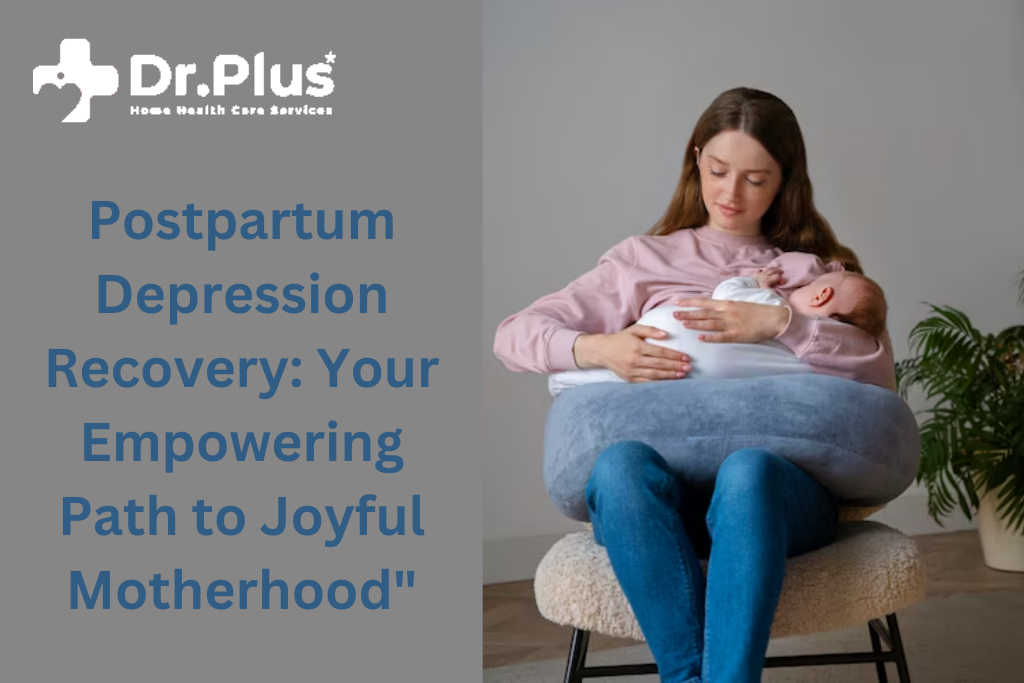
Postpartum Depression Recovery: Your Empowering Path to Joyful Motherhood"
What is Postpartum Depression?

Bringing a baby into the world is an incredible experience, but it’s not always filled with joy and excitement for every new mom. After the child birth many women experience the Postpartum depression (PPD) It’s more than just the “baby blues,” which are short-term mood swings that many mothers experience. PPD is deeper and can last much longer, making it hard for moms to care for themselves or their babies.
Some common signs of postpartum depression include feeling intensely sad, anxious, or overwhelmed. Moms might struggle to bond with their baby or feel exhausted all the time. Every family member need to understand that PPD is a medical condition—But not the sign of weakness
What Are the Symptoms of Postpartum Depression?
Postpartum depression doesn’t look the same for everyone, but here are some common symptoms to watch for:
- Most of the time experiencing the loneliness and feeling sad.
- Showing less interest in activities that once brought joy.
- Constant fatigue and low energy.
- Trouble connecting with your baby.
- Changes in appetite or sleep patterns.
- Irritability or frequent mood swings.
- Difficulty focusing or making decisions.
Thoughts of self-harm or fear of harming the baby can arise. If these feelings persist for more than two weeks, it’s crucial to seek professional help

How to Cope with Postpartum Depression

Coping with postpartum depression can feel overwhelming, but with the right tools and support, recovery is absolutely possible. some steps to follow that can help you physically and mentally:
- Talk to a Professional
- Therapy: Engaging with a therapist offers a safe space to explore your emotions and build effective coping mechanisms. Cognitive-behavioral therapy (CBT) is particularly beneficial in addressing postpartum depression.
- Medication: Sometimes, doctors may prescribe antidepressants. If you’re breastfeeding, your doctor will guide you toward safe options.
- Support Groups: Engaging and getting connected with other moms who are experiencing the same phase can be extremely
- Take Care of Yourself
- Rest When You Can: Sleep deprivation is tough on your body and mind. Try to nap when your baby sleeps, or ask someone to help with nighttime feedings.
- Eat Well: Healthy foods like fruits, vegetables, and lean proteins can boost your energy and mood.
- Move Your Body: Even a short walk around the block can release feel-good hormones and clear your mind.
- Find Moments of Calm: Whether it’s yoga, meditation, or simply taking deep breaths, small moments of relaxation can go a long way.
- Speak Up About Your Feelings
- Speak with you partner, family or friends on regular basis and share how you are feeling as emotions is full of rollercoaster ride. Keeping emotions withing you can make things worse.
- Writing in a journal can also be a helpful way to organize your thoughts and track your progress.
- Connect with Your Baby
- Spend time with your baby by hugging, cuddling and talking. These moments can help strengthen your bond and release oxytocin, a hormone that promotes feelings of love and connection.
How Can Family Help with Postpartum Depression?
Family plays a vital role in supporting a new mom dealing with postpartum depression. Here’s how you can help:
- Learn the Signs
- Educate yourself about postpartum depression so you can recognize the symptoms. Don’t brush off her feelings as “just hormones” or assume she’ll get over it on her own.
- Step In with Practical Help
- The small act of kindness and service can be a great help to new mom. lending hands in cooking meals, doing laundry or by cleaning the house can make her feel relaxed and she can enjoy her me time
- Help with baby care, like changing diapers, feeding, or rocking the baby to sleep, so she can rest.
- Be a Listening Ear
- Let her talk about her feelings without judgment. Sometimes, simply being there and listening can be the greatest support.
- Reassure her that she’s not alone and that it’s okay to ask for help.
- Encourage Professional Help
- If her symptoms seem severe or persistent, gently suggest seeing a doctor or therapist.
- Offer to go with her to appointments if she feels nervous or overwhelmed.
- Partners Have a Key Role
- Partners should actively share responsibilities and spend quality time with the mom. Even small gestures, like a hug or kind words, can make her feel supported.
- Be patient and understanding—recovery takes time.
- Take Care of Yourself Too
Supporting someone with postpartum depression can be emotionally draining. Make sure to prioritize your own mental and emotional well-being so you can continue to provide the best support.

Why It’s Important to Seek Help
Ignoring postpartum depression can have long-term effects on both the mother and the baby. A mom who feels supported and gets the help she needs is more likely to recover and build a strong, loving bond with her baby. Seeking help is not a sign of weakness—it’s a step toward healing and becoming the best version of yourself for your little one.
Postpartum depression is more common than many people realize, but it’s also treatable. With the right support, tools, and professional help, moms can overcome this challenging time and embrace the joys of motherhood. Family and friends play a crucial role in this journey by offering practical help, emotional support, and encouragement to seek professional care when needed.
